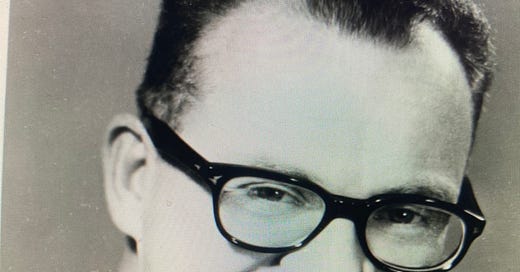The Bird Tapes Interview: Ernie Harwell
Before he became a Detroit baseball broadcasting legend, he handled radio and TV for the Orioles in the 1950s. Interviewed at age 81 in 1999, he was in rare form as a raconteur and oral historian.
When I wrote my oral history of the Orioles a quarter-century ago, one of my challenges was finding people to interview from the franchise’s first years in Baltimore. More than four decades had passed since the St. Louis Browns moved east and made Memorial Stadium their home. Some players on the early Orioles had passed away; others were up in years. Fortunately, I was able to locate Gus Triandos, George Kell, Billy Hunter and several other stalwarts.
I was still writing a column for The Baltimore Sun in those days, which meant spending many days and nights at Oriole Park at Camden Yards. When the Detroit Tigers came in for a series in August of 1999, I crossed paths in the press box with Ernie Harwell, their beloved radio play-by-play man, then about to celebrate his fortieth year of broadcasting baseball in Detroit. I didn’t literally smack myself in the forehead, but I realized I had found an obvious solution to my challenge of finding people to interview from the Orioles’ early years, Before he became a fixture in Detroit, Harwell handed the play-by-play on the Orioles’ radio and TV broadcasts for six years — their first six years in Baltimore.
When I told him about my book project and asked if I could interview him, he happily consented and invited me to come to the Tigers’ hotel the next day. I showed up, microcassette recorder in hand, and sat with him in his room as he ordered and ate a room service breakfast.
Most of the vintage interviews I’ll be posting here at The Birds Tapes are with individuals who wore the Orioles’ uniform as a player, manager or coach. (Spoiler alert: Next up after Harwell is my conversation with Earl Weaver, recorded in the fall of 1999 at his golf club in South Florida.) But a quarter-century later, Harwell’s interview stands out as one of the gems, truly a rare find. The legendary broadcaster was 81 years old but still in his prime as a raconteur and oral historian, vividly recounting players, games, personalities and incidents from the years when the Orioles were simply trying to find their footing in a new city.
It shouldn’t be a surprise that he remembered so much about the team and the city. He didn’t just work here; he moved to Baltimore with his family and put down roots, buying a home in the Evergreen neighborhood that suited him because it had a stable and his wife owned a horse. Under contract at different times to the city’s rival National and Gunther breweries, he worked the Baltimore Colts’ football radio and TV broadcasts at times as well as those of the Orioles. His partners included Chuck Thompson and Bailey Goss, broadcasting names that conjure vivid memories in Baltimore. His kids played in the Roland Park Baseball League.
Although he was only 36 when he arrived in 1954, he’d already lived a full baseball life. As a child in Atlanta, he’d worked as a batboy for the Crackers, a Double A minor-league team popular throughout the South. Later, he became their radio voice, showing such promise that the Brooklyn Dodgers hired him. He’d worked for the New York Giants before coming to Baltimore.
When he left Baltimore for Detroit in 1960, it was the start of an association that would come to define him. It was said that Harwell was so popular in Michigan that he should run for governor. He stuck to baseball.
He died at age 92 in 2010.
I’ve broken my interview with him into two segments, hopefully making it more consumable. As previously noted, the Bird Tapes will consist of a blend of written posts about Orioles history, available to all, and posts such as this with vintage interviews, which are premium content, available to paid subscribers. If you haven’t already, please consider upgrading to a paid subscription, which makes it easier for me to handle the costs associated with making these rare interviews available. (Note: New subscribers can hear the interviews during a one-week free trial.)
Keep reading with a 7-day free trial
Subscribe to The Bird Tapes to keep reading this post and get 7 days of free access to the full post archives.





